Caryn’s Thoughts
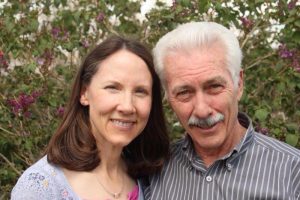 When my sister-in-law, Jennifer Parmely met her partner, Brian Cratty, I remember thinking about how quiet he was. I suppose it isn’t surprising to have someone be a little quiet when meeting a large family like ours is. It takes a brave person to walk into a big family for the first time. I know, because I’ve been there. So when Jennifer brought Brian to meet the family I felt a little bit sorry for him. It’s sort of like standing before a crowd of hundreds of people to give your first public speech, and you’re 13 years old. Once you get to know Brian, you can see the gentle, kind man that Jennifer fell in love with.
When my sister-in-law, Jennifer Parmely met her partner, Brian Cratty, I remember thinking about how quiet he was. I suppose it isn’t surprising to have someone be a little quiet when meeting a large family like ours is. It takes a brave person to walk into a big family for the first time. I know, because I’ve been there. So when Jennifer brought Brian to meet the family I felt a little bit sorry for him. It’s sort of like standing before a crowd of hundreds of people to give your first public speech, and you’re 13 years old. Once you get to know Brian, you can see the gentle, kind man that Jennifer fell in love with.
Brian and Jennifer are soulmates. They have the same interests, and are going in the same direction. They love spending time on the mountain, and the time of year doesn’t matter a bit. For them, Summer is no different than Winter, when it comes to how much they like it that is. I personally don’t care for Winter…in any location. I love the mountains, but in the Summer, when I can hike. Brian and Jennifer, and most of their family, love to ski, so the mountain in the Winter is great for them too. Brian likes to ski, and hike, but one of his favorite 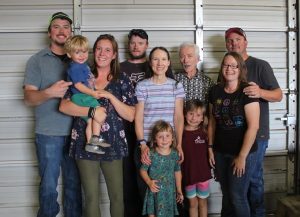 activities in mountain biking. He gets on his bicycle and hits the trails around their cabin on the mountain. She might not see him for an hour at a time, because he is out there in his own world.
activities in mountain biking. He gets on his bicycle and hits the trails around their cabin on the mountain. She might not see him for an hour at a time, because he is out there in his own world.
Brian has been such a blessing to Jennifer’s family, and to the rest of our family. The little kids love him, and he is very good to them. He fits in well with all of us, and while he is a quiet man, he can carry on a great conversation with the best of ’em. We all love having him around, and he is a great partner to Jennifer, and grandpa to the babies. Today is Brian’s birthday. Happy birthday Brian!! Have a great day!! We love you!!
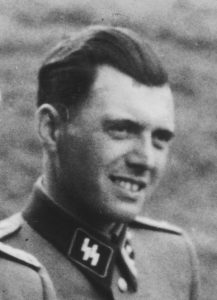
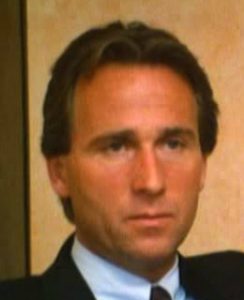 Rolf Mengele was born in March 16, 1944 in Freiburg, Germany to Irene Schoenbein and Dr Joseph Mengele…also known as the Angel of Death, but his father went into hiding after the war, and escaped to Argentina in 1949. Because of this, Rolf grew up in a loving home with his grandparents and his mother. He didn’t meet his father until he was a teenager, because he was told that he was dead.
Rolf Mengele was born in March 16, 1944 in Freiburg, Germany to Irene Schoenbein and Dr Joseph Mengele…also known as the Angel of Death, but his father went into hiding after the war, and escaped to Argentina in 1949. Because of this, Rolf grew up in a loving home with his grandparents and his mother. He didn’t meet his father until he was a teenager, because he was told that he was dead.
When he turned 16, Rolf learned that his father was actually alive when Joseph made contact with him. It was an unhappy revelation for him. His father made attempts to bond with him through letters, even writing and illustrating a children’s book for him, but to no avail. His father’s attempts didn’t stop the feelings of disgust he felt about his father’s beliefs and actions. Still, at 16, he felt a curiosity about his dad, and wanted to meet him. Since Joseph Mengele was still wanted by Nazi-Hunters, for his war crimes, it took Rolf 5 years to arrange a trip to Brazil to visit his father.
Rolf had to travel under a stolen passport, but he wanted to go, because he wanted to understand how his father could have been an active participant in the Nazi death machine. He didn’t wait long, after his arrival, to bring up the subject of Auschwitz. His dad immediately became defensive, denying any responsibility for the atrocities, but actually admitting to participating in the nightmare “experiments” that the Jewish people were subjected to. He acted like he was doing them a favor, saying, “What was I supposed to do with those people? They were sick and half-dead when thy arrived.” He tried to tell his son that all he was doing was to determine who was fit to work. He actually claimed to have saved several thousand people by allowing them to work.
After his visit, Rolf found it “impossible to betray his father’ location,” but his feelings of disgust remained with him for the rest of his father’s life. Rolf says, “I didn’t even bother to listen to him or think of his ideas. I simply rejected everything he presented. I will never understand how human beings 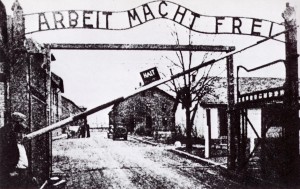 could do those things. That my father was one of them doesn’t change my opinion.”
could do those things. That my father was one of them doesn’t change my opinion.”
Joseph Mengele’s health began to deteriorate in 1972. In 1976 he suffered a stroke. Then on February 7, 1979, he had another stroke while swimming in the Atlantic Ocean off of Bertioga, Brazil during a visit with friends. He drown and was buried under the alias of Wolfgang Gerhard, which he had been using since 1971. Rolf abandoned the Mengele name in 1980, taking his wife’s last name to spare his children the burden of their grandfather’s past. Rolf and his family live in Freiburg, Germany, where he is an attorney.
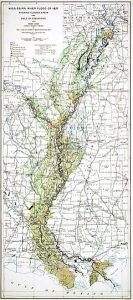 The Mississippi River is a is the widest river in the United States. It’s mere size and the amount of water in it, makes one expect that at some point, it is going to flood. In fact, it has flooded many times over the years, but none was anything like the Great Mississippi Flood of 1927. It was the most destructive river flood in the history of the United States. In all, 27,000 square miles of land were inundated with water up to a 30 feet depth. In all, 630,000 people were affected by the flood. About 94% of them lived in the states of Arkansas, Mississippi, and Louisiana, most in the Mississippi Delta. At least 15 inches of rain fell in 18 hours causing the Mississippi River to brake out of its levee system at 145 locations. Ten states were affected…Arkansas, Illinois, Kentucky, Louisiana, Mississippi, Missouri, Tennessee, Texas, Oklahoma, and Kansas. Arkansas was the worst affected with 14% of the state flooded.
The Mississippi River is a is the widest river in the United States. It’s mere size and the amount of water in it, makes one expect that at some point, it is going to flood. In fact, it has flooded many times over the years, but none was anything like the Great Mississippi Flood of 1927. It was the most destructive river flood in the history of the United States. In all, 27,000 square miles of land were inundated with water up to a 30 feet depth. In all, 630,000 people were affected by the flood. About 94% of them lived in the states of Arkansas, Mississippi, and Louisiana, most in the Mississippi Delta. At least 15 inches of rain fell in 18 hours causing the Mississippi River to brake out of its levee system at 145 locations. Ten states were affected…Arkansas, Illinois, Kentucky, Louisiana, Mississippi, Missouri, Tennessee, Texas, Oklahoma, and Kansas. Arkansas was the worst affected with 14% of the state flooded.
It was Good Friday, April 15, 1927, the disaster began when 15 inches of rain fell in New Orleans in 18 hours. More than 4 feet of water covered parts of the city. A group of influential bankers in town met to discuss how to guarantee the safety of the city, as they had already learned of the massive scale of flooding upriver. A few weeks after, they arranged to set off about 30 tons of dynamite on the levee at Caernarvon, in an effort to flood a less populated area and save the cities that would have been severely damaged. I’m not sure how much this effort helped, and in the end, about 500 people lost their lives anyway. It wouldn’t be the last Mississippi River flood, but it would be the worst.
As a result of the flooding, many of the misplaced people joined the Great Migration from the south to northern and midwestern industrial cities rather than return to rural agricultural labor. I would think that the idea of such a massive amount of cleanup would be more than many people could take. This massive population movement increased from World War II until 1970. Of course, this volume of population movement would not be good for the states who were losing people. To try to prevent future floods, the federal government built the world’s 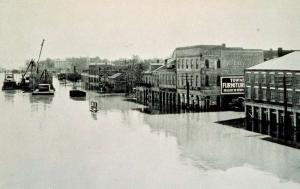
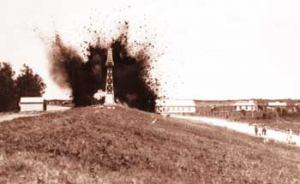 longest system of levees and floodways. By August 1927, when the flood subsided, hundreds of thousands of people had been made homeless and displaced; properties, livestock and crops were destroyed. Flooding on the Mississippi is not an unusual event, and no matter how many precautions we take, there will still be losses when the river overflows its banks.
longest system of levees and floodways. By August 1927, when the flood subsided, hundreds of thousands of people had been made homeless and displaced; properties, livestock and crops were destroyed. Flooding on the Mississippi is not an unusual event, and no matter how many precautions we take, there will still be losses when the river overflows its banks.
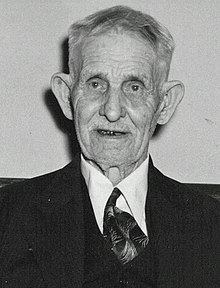
 Imagine being a witness to a part of history. Of course, we all are. We witness our part of history, because history happens all around us. It’s just that some events are more. More what you might ask. More devastating, more tragic, more exciting, just more. One such event was the assassination of President Lincoln. I can’t begin to imagine what it would have been like to go out for a night at the theater only to have the evening shattered be gunfire…and then to look up and see that your President was slumped over, bleeding, and dying. Now imagine you were just a child at the time.
Imagine being a witness to a part of history. Of course, we all are. We witness our part of history, because history happens all around us. It’s just that some events are more. More what you might ask. More devastating, more tragic, more exciting, just more. One such event was the assassination of President Lincoln. I can’t begin to imagine what it would have been like to go out for a night at the theater only to have the evening shattered be gunfire…and then to look up and see that your President was slumped over, bleeding, and dying. Now imagine you were just a child at the time.
That was the situation Samuel Seymour found himself in on April 14, 1865. On April 14, 1865, Seymour was five years old, when his godmother, who was the wife of his father’s employer took him to see Our American Cousin at Ford’s Theater in Washington DC. They were sitting in the balcony across the theater from the Presidential box. Everyone knew President Lincoln. I don’t know how star struck people got back then. Not nearly as much as today, but everyone knew him. A while later, says Seymour, “All of a sudden a shot rang out…and someone in the President’s box screamed. I saw Lincoln slumped forward in his seat.” Suddenly, John Wilkes Booth jumped from the box to the stage. What five year old boy wouldn’t remember those two events. Of course, Seymour didn’t understand what had happened to President Lincoln, 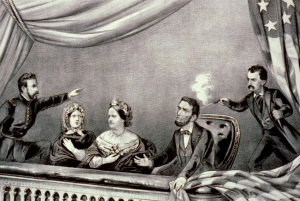 but he was very concerned for Booth, who broke his leg in the jump. He was just a child.
but he was very concerned for Booth, who broke his leg in the jump. He was just a child.
As a child, Seymour was the youngest person in the theater. Most, if not all of the people there were adults. Two months before his death, Seymour appeared on the February 9, 1956, broadcast of the CBS TV panel show “I’ve Got a Secret.” Seymour was hurt in a fall prior to the show, and the show’s producers had urged Seymour to postpone his appearance on the show. Seymour’s doctor left the choice up to Seymour, Seymour chose to go on. During the panelists correctly guessed that Seymour witnessed the assassination of Lincoln. Seymour died on April 12, 1956, and with that, the last witness to Lincoln’s assassination was gone.
 I’ve heard that in some cases, inmates who have proven themselves can become an inmate guard. I don’t know of the validity of this practice, but I do know that during the reigning Third Reich, many Jewish prisoners were forced to become guards, or Sonderkommandos, in the camps that housed the Jews. It wasn’t a paid position, or even one with added security or benefits. It was a force position…one for which the penalty of failure was death.
I’ve heard that in some cases, inmates who have proven themselves can become an inmate guard. I don’t know of the validity of this practice, but I do know that during the reigning Third Reich, many Jewish prisoners were forced to become guards, or Sonderkommandos, in the camps that housed the Jews. It wasn’t a paid position, or even one with added security or benefits. It was a force position…one for which the penalty of failure was death.
For almost three years, 2,000 Sonderkommandos did such work under threat of execution. Their fellow prisoners despised them. Everyone knew who they were, and what they did. The Sonderkommandos were both feared and hated by their fellow prisoners!! The horrors they had to endure new no bounds. Some even had to dispose of the corpses of their relatives and neighbors. I can’t imagine having to carry off a dead relative to be thrown into a mass grave without even so much as a few words said over them. The Sonderkommandos no only had to do that, but then they had to either go back to, or continue working, as if nothing had happened at all.
Being a Sonderkommando did nothing to ensure that they would survive the war, or even the next month, because the Germans either out of necessity, or just brutality, replace the Sonderkommandos every six months. I’m sure these people knew, when they were placed in the position, that their days were numbered. The problem with being a Sonderkommando was not that they fought against doing their jobs, or tried to escape, it was that they simply knew too much. These people were eyewitnesses to the atrocities of the Holocaust, and therefore a liability. They could put the Germans in prison for crimes against humanity. The Nazis could not let that happen, so they used the Sonderkommandos for six months, then killed them and replaced them with another one.
Because of this practice, only a hundred or so survived the war. These survivors were eyewitnesses to the exterminations that Holocaust deniers challenge. They were to become some of the Nazis worst nightmares. One man…Dario Gabbai, a Greek Jew, who was imprisoned at Auschwitz, is quite possibly the last of the Sonderkommandos, and certainly one of the most prominent. Gabbai settled in California after the war and 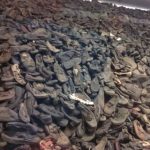 described the grim work he did in a handful of Holocaust documentaries…including “The Last Days,” which won an Academy Award for best documentary in 1999. The things Gabbai had to while he was a Sonderkommando at Auschwitz would haunt him for the rest of his life. People who have been forced to participate in horrible atrocities often blame themselves for the participation. Somehow, while logic tells us that there was nothing he could have done to stop the nightmare, he thinks he should have refused to do it, even if it meant his own death. He thinks himself a coward for being afraid to die, or for wanting desperately to live.
described the grim work he did in a handful of Holocaust documentaries…including “The Last Days,” which won an Academy Award for best documentary in 1999. The things Gabbai had to while he was a Sonderkommando at Auschwitz would haunt him for the rest of his life. People who have been forced to participate in horrible atrocities often blame themselves for the participation. Somehow, while logic tells us that there was nothing he could have done to stop the nightmare, he thinks he should have refused to do it, even if it meant his own death. He thinks himself a coward for being afraid to die, or for wanting desperately to live.
Of course, he wasn’t a coward. The very fact that he did survive makes him a hero. He was able to document the Holocaust and later relate what he witnessed. When his family reached Auschwitz, Dario’s father, mother, and younger brother were sent to the gas chambers. His sister had died as an infant, before Auschwitz. Dario and his brother, Jakob, were young…in their 20’s and strong, so they were made Sonderkommandos. He recalls seeing the doomed Jewish people taken into the gas chambers, under pretense of having a shower. Then, he remembers hearing the screams of the women and children…the crying and scratching on the walls as they desperately tried to get out…and the desperate gasping efforts to keep breathing, and then…the deathly silence. When the doors opened, the Sonderkommandos had to climb over bodies piled five and six feet high to harvest glasses, gold teeth and prosthetic limbs, before hauling out the corpses and washing down floors and walls covered in blood and excrement. Gabbai said, “I saw the people I just saw alive, the mother with the kids in their arms, some black and blue from the gas, dead. I said to myself — my mind went blind, how can I survive in this environment?” Gabbai and other Sonderkommandos had to drag the bodies to an elevator that would lift them one flight to the furnace floor. There was also a dissecting room, where jewels and other valuables hidden in body crevices would be removed. To endure such grim work, Gabbai said, he “shut down” and became an “automaton.”
The Germans preferred less common nationalities like Greek and Ladino-speaking Jews for these tasks, because they could not easily communicate the precise details of the factorylike slaughter to Polish, Hungarian and other European inmates. “They had seen too much and known too much,” Mr. Berenbaum, long-time friend of Gabbai said. It is no wonder Gabbai only wanted to get away…far away to California, after the war. When 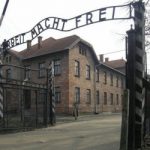 Gabbai was liberated, he weighed 100 pounds. He couldn’t face his haunting memories. He needed to get away from all German memories. He made his way to Athens, where he helped settle refugees for the American Jewish Joint Distribution Committee. In 1951, he immigrated to the United States through the sponsorship of the Jewish community of Cleveland, and two years later he moved to California for “its beautiful beaches, beautiful women and sunshine,” he told Mr Berenbaum. In California Gabbai finally found, if not peace, at least a light beyond the darkness of his past. In the mid-1950s, he married Dana Mitzman. They divorced, but had a daughter, Rhoda, who survives him. He passed away on March 25, 2020, at 97 years old, in California. Whether Gabbai ever achieved peace with his past or not will never be known.
Gabbai was liberated, he weighed 100 pounds. He couldn’t face his haunting memories. He needed to get away from all German memories. He made his way to Athens, where he helped settle refugees for the American Jewish Joint Distribution Committee. In 1951, he immigrated to the United States through the sponsorship of the Jewish community of Cleveland, and two years later he moved to California for “its beautiful beaches, beautiful women and sunshine,” he told Mr Berenbaum. In California Gabbai finally found, if not peace, at least a light beyond the darkness of his past. In the mid-1950s, he married Dana Mitzman. They divorced, but had a daughter, Rhoda, who survives him. He passed away on March 25, 2020, at 97 years old, in California. Whether Gabbai ever achieved peace with his past or not will never be known.
 I have known my sister-in-law, Jennifer Parmely since she was just 13 years old. Jennifer was just coming into her own, and she had a confidence and sophistication about her that were beyond her years. Jennifer wasn’t shy, and that made her easy to talk to, and made people want to be around her. She was a sweet girl, and I loved her immediately. I had little sisters, but now, with Jennifer and her 11 year old sister, Brenda Schulenberg, I had two more. I also got a little brother, Ron Schulenberg, and two older sisters, Debbie Cook and Marlyce Schulenberg.
I have known my sister-in-law, Jennifer Parmely since she was just 13 years old. Jennifer was just coming into her own, and she had a confidence and sophistication about her that were beyond her years. Jennifer wasn’t shy, and that made her easy to talk to, and made people want to be around her. She was a sweet girl, and I loved her immediately. I had little sisters, but now, with Jennifer and her 11 year old sister, Brenda Schulenberg, I had two more. I also got a little brother, Ron Schulenberg, and two older sisters, Debbie Cook and Marlyce Schulenberg.
Watching Jennifer grow up, I knew she had so much potential. She got a job at the hospital as a Candy Striper, as they were called then. I’m not sure what they are called now. By the time she was 17 she knew that she wanted to be a nurse, and more specifically, a Labor and Delivery Nurse. Her dream has never changed, and she worked very hard to get the degree she needed to reach her goal. She went to work at Wyoming Medical Center, and has been helping deliver babies since that time. After a number of years at Wyoming Medical Center, she is getting ready to retire in the next few years. Then she will be free to enjoy her activities and her four grandchildren, Reagan, Hattie, Bowen,  and Maeve, her kids, and her partner Brian Cratty.
and Maeve, her kids, and her partner Brian Cratty.
Jennifer has been an inspiration to us for all these years, and having her there to help with baby delivery, has been the greatest blessing of all. She especially inspired my daughter, Corrie who has decided to follow in her Aunt Jennifer’s footsteps by becoming a nurse too. Jennifer has inspired many of us. Her healthy eating habits, and her exercising have been something the whole family we have all watched for over 25 years. We also wished we were as dedicated to health as she was. Her hiking, jogging, and skiing have given all of us ideas about what we might like to do, and who we want to be when we grow up…hahahaha!! Even those of us who are older than Jennifer. Today is Jennifer’s birthday. Happy birthday Jennifer!! Have a great day!! We love you!!
 This year, with the Coronavirus, we find ourselves in a very different type of Easter holiday. Most of us are away from our family, and so we won’t be having the traditional Easter dinner and gathering. It’s a very strange year, but in one way, it is a return to a more spiritual holiday. People who have little ones probably will have the candy, and maybe the traditional dinner, but those of us, who have family that don’t live with us, children, grandchildren, and great grandchildren whether they live far away, or right here in the same city, can’t get together with our families. It is the hardest thing we have ever done, especially those with young grandchildren and great grandchildren. It is terrible hard not to hold them or kiss them. We are grateful for things like FaceTime, and telephone, but they are a very poor substitute for being there together.
This year, with the Coronavirus, we find ourselves in a very different type of Easter holiday. Most of us are away from our family, and so we won’t be having the traditional Easter dinner and gathering. It’s a very strange year, but in one way, it is a return to a more spiritual holiday. People who have little ones probably will have the candy, and maybe the traditional dinner, but those of us, who have family that don’t live with us, children, grandchildren, and great grandchildren whether they live far away, or right here in the same city, can’t get together with our families. It is the hardest thing we have ever done, especially those with young grandchildren and great grandchildren. It is terrible hard not to hold them or kiss them. We are grateful for things like FaceTime, and telephone, but they are a very poor substitute for being there together.
That said, I think that a number of us who are at home…alone or in couples, and not planning to have a special meal, are taking a step backward and reflecting on this day separately from the meal and gathering. It is a unique opportunity to focus on the real reason for this day. to focus without all the meal prep, table setting, and clean up. What a strangely wonderful opportunity!! Strange…only because we are free focus completely on Jesus and what He did for us. Usually, we honor Him by going to church, and then we come home to the preparations for the gathering with family. Next year, that is what we will do again, and that is ok, but this  year…with social distancing, is a rare “gift” that we won’t have again, and that is ok too, because we would rather spend this day with our loved ones. We would rather spend this day with our family, and honor our Saviour together, but that is not to be. We will all miss each other very much today, as we do any time we are apart. And when this is over…truly over, we will all have a special dinner…a type of redemption dinner, when we are redeemed for quarantine, and free to gather once again. Then we will come together and celebrate the victory over Coronavirus…victory that Jesus won for us when He died on the cross to save us from sin, sickness, and disease. The He rose again to tell us all the wonderful news. Happy Easter to all…alone together, the way it needs to be for now.
year…with social distancing, is a rare “gift” that we won’t have again, and that is ok too, because we would rather spend this day with our loved ones. We would rather spend this day with our family, and honor our Saviour together, but that is not to be. We will all miss each other very much today, as we do any time we are apart. And when this is over…truly over, we will all have a special dinner…a type of redemption dinner, when we are redeemed for quarantine, and free to gather once again. Then we will come together and celebrate the victory over Coronavirus…victory that Jesus won for us when He died on the cross to save us from sin, sickness, and disease. The He rose again to tell us all the wonderful news. Happy Easter to all…alone together, the way it needs to be for now.

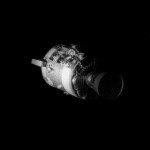 On this the 50th anniversary of the Apollo 13 near disaster, I am reminded of the tenacity of the human spirit. The space program was becoming commonplace, and while the plan was to televise parts of the mission, the networks decided not to play the program, because space travel had become mundane…nothing new happened, and it was then, as it is now, that sensationalism sells news. Then, completely unexpectedly, everything changed. Our astronauts were in serious trouble. After the explosion that would render the space capsule useless, and those famous words were uttered, “Houston, we’ve had a problem here,” everyone wanted to follow this very serious situation. Now it was important to watch this previously mundane mission.
On this the 50th anniversary of the Apollo 13 near disaster, I am reminded of the tenacity of the human spirit. The space program was becoming commonplace, and while the plan was to televise parts of the mission, the networks decided not to play the program, because space travel had become mundane…nothing new happened, and it was then, as it is now, that sensationalism sells news. Then, completely unexpectedly, everything changed. Our astronauts were in serious trouble. After the explosion that would render the space capsule useless, and those famous words were uttered, “Houston, we’ve had a problem here,” everyone wanted to follow this very serious situation. Now it was important to watch this previously mundane mission.
The reactions, both before and after the explosion, are completely normal. People tend to look for the excitement is life to keep them interested…good or bad excitement. We find ourselves glued to the television after a disaster, hoping to learn something new. We are the same way about exciting good news, but with the Apollo 13 mission, the news of another lunar landing wasn’t new. We had seen it all before…until it all went wrong. The NASA families, and especially the families of the astronauts in trouble, were less than impressed by the sudden interest in their men onboard Apollo 13, and I can understand why. It seemed no one cared, until it went wrong. Yes, the people wanted the men home safely, but it was the drama that drew them to the situation, and finally, had us thinking about something outside of ourselves. Yes, all turned out great in the end, and the men came home safely, but the space program didn’t increase in importance in our lives…until the next disaster, that is.
It’s not that we, the people are not interested in anything that doesn’t keep us riveted to our chair, staring at the news, but that we tend to overlook much of what is going on around us, until it affects us. Take the Coronavirus for example. Diseases come and go, and provided it doesn’t impact us or the ones we love, most diseases come and go with little notice by the general public. That’s why pandemics are so widely televised and watched. The affect everyone, in one way or another. We might know someone who has it, or have people in the disease hotspots, or have someone working in healthcare who is dealing with it, or we might just find ourselves drawn to the situation because we are one nation living in one world. Whatever our reason, suddenly we are interested, and that’s when we step outside of ourselves.
I have been very moved by the response of the American people during the Coronavirus Pandemic. We have seen people making medical masks for the hospitals, collecting food for those in need, and going to the store for those who can’t. We have seen people cheering the first responders, healthcare workers, grocery store workers, and food workers, who have all stayed on the job, to keep things running smoothly. We have other businesses that have had to stay open too…the banks, insurance agencies, sanitation workers, street workers, agriculture workers, military and national guard members, and a number of others. All these people are heroes. We could not stay at home, like we have been asked to do, if these heroes didn’t get up and go to work every  day, despite personal risks. As President Trump has said, we are at war…fighting an invisible enemy, so anyone who leaves their house takes a certain measure of risk of contracting the disease. Those who go to work are the bravest people we have. We owe them so much. We have also seen many people who have changed up their entertainment mediums, and have started giving free concerts on the internet. Churches have started streaming services. Choirs from many other areas have put together “social distancing” performances. All these things are designed to keep our spirits up…something we all need in these trying times. The thing that I find the most amazing is how we have all came together, how we stepped outside of ourselves to make a difference.
day, despite personal risks. As President Trump has said, we are at war…fighting an invisible enemy, so anyone who leaves their house takes a certain measure of risk of contracting the disease. Those who go to work are the bravest people we have. We owe them so much. We have also seen many people who have changed up their entertainment mediums, and have started giving free concerts on the internet. Churches have started streaming services. Choirs from many other areas have put together “social distancing” performances. All these things are designed to keep our spirits up…something we all need in these trying times. The thing that I find the most amazing is how we have all came together, how we stepped outside of ourselves to make a difference.
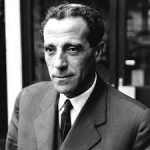
 As Hitler’s vicious plan to wipe out the Jewish people started to come together, many Jewish people found their lives ripped away from them, and then, found themselves in the ghettos…if they were lucky, or the “work” camps…if they weren’t. Eventually the plan was to move all the Jews to the camps, or to transport them into the woods and shoot them. Once people were moved into the camp, there was pretty much one way out of there…death. The people dreamed of escaping the camps, but it was futile…until April 10, 1944.
As Hitler’s vicious plan to wipe out the Jewish people started to come together, many Jewish people found their lives ripped away from them, and then, found themselves in the ghettos…if they were lucky, or the “work” camps…if they weren’t. Eventually the plan was to move all the Jews to the camps, or to transport them into the woods and shoot them. Once people were moved into the camp, there was pretty much one way out of there…death. The people dreamed of escaping the camps, but it was futile…until April 10, 1944.
Rudolf Vrba and Alfred Wetzler came from the same hometown of Trnava in Slovakia. Being from the same town, they knew they could trust each other. The two men were determined to escape from Auschwitz so they could somehow let the rest of the world know what was going on there. Every day, they probed Auschwitz for weaknesses. While they searched, they were formulating escape plans. Day after day they rejected plans that they knew would only get them killed, and spoil their chances of completing their mission to save their people. Finally, one day, Fred Wetzler approached Rudi Vrba with a plan that seemed plausible. For the first time, they felt like they had a chance to succeed.
Fred told Rudolf about a pile of wooden planks stacked outside the camp perimeter waiting to be used for construction of a new facility. Fred said he knew of four prisoners planning to hide in a cavity in the middle of the wood pile. The plan was to wait for the SS guards to conclude a mandatory three-day search, and then make their escape and head south toward Slovakia. It was risky, but a few days later the plan went off without a hitch…at least the escape did. The initial strategy planned by the four prisoners, of hiding in the wood planks had worked, and they got away, but a few days later the four prisoners were caught in the village south of the camp. Rudi and Fred were worried that the four prisoners would reveal the method of their escape to the SS, but to their credit, they kept silent.
The secret of the cavity in the stack of planks stayed a secret, and a couple of weeks later, Fred and Rudi decided to attempt the same escape plan themselves. Their escape was far more successful than the escape of the first four prisoners. Once they were out of Auschwitz, Fred and Rudi had roughly 80 miles of Nazi occupied Poland ahead of them before the reached Slovakia. Their journey wasn’t a straightforward trip. They got lost and wandered around a village called Bielsko. It took them all night to find their way out and then in broad daylight, they had no choice to ask for help. They knocked on the door of a house and a woman, knowing that they were on the run, let them in and fed them. Then later that night, she gave them money, and told them how to escape through the mountains.
Of course, their journey was not without it troubles. At one point, they crossed paths with a German patrol. A gun shot sent them scrambling for cover. They heard dogs howling, and as they were running they came upon a stream. It would save them in the end. The water hid their scent, and while the water was freezing, they crossed the stream, and escaped. More strangers helped them along their journey, and against all odds, the two men made it to the Polish-Slovak borer.
On April 21st, 1944, fourteen days after they emerged from the stack of planks, Rudi Vrba and Fred Wetzler reached Slovak soil. Once inside Slovakia, they met yet another sympathetic peasant who brought them to a prominent doctor in the town of Cadca. The doctor listened to their story and said, “Tomorrow I’ll take you to the leaders of the Jewish community in Zilina. They’ll know what’s best to do.” For the rest of his life, Rudolf Vrba, who had escaped from Auschwitz determined to warn the world about the death factory before another train load of Jews could be shipped there, wished the doctor had been right.
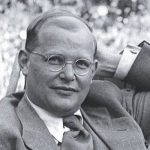 I think we have all thought that the German people were in agreement with the Nazis, but there were, in fact, many German people who fought hard for the other side. One such person who was active in the German resistance was Dietrich Bonhoeffer, who was a Protestant Lutheran Pastor and theologian. He hated Nazism and Hitler’s horrific ideas, and his strong hatred of these things brought him to a place of knowing that he had to do something…anything to stop the murderous regime.
I think we have all thought that the German people were in agreement with the Nazis, but there were, in fact, many German people who fought hard for the other side. One such person who was active in the German resistance was Dietrich Bonhoeffer, who was a Protestant Lutheran Pastor and theologian. He hated Nazism and Hitler’s horrific ideas, and his strong hatred of these things brought him to a place of knowing that he had to do something…anything to stop the murderous regime.
Bonhoeffer was born February 4, 1906 in Breslau, Germany. His family were not religious, but had a strong musical and artistic background. From his childhood days, Bonhoeffer displayed great musical talent, and the pursuit of music was important to him throughout his life. As he grew, I’m sure his family had great plans for his musical future…hoping for him to be a famous musician. When Bonhoeffer turned 14, he announced that he wanted to train and become a priest…a revelation that completely shocked his family.
Despite their displeasure at his announcement, Bonhoeffer attended the University of Berlin, graduating in 1927 with a doctorate in theology for his influential thesis, Sanctorum Communio, which means Communion of Saints. After his graduation, Bonhoeffer spent time in Spain and America. This was likely a good thing, because it gave him a wider outlook on life and helped him move from academic study to a more practical interpretation of the Gospels. He became quite interested in the concept of the Church’s involvement in social justice and protection of those who were oppressed. His wide travels also encouraged a greater interest in ecumenism, which is the outreach to other churches.
At the age of 25, Bonhoeffer was ordained as a priest. Because the early 30’s were a period of great upheaval in Germany, with the instability of Weimar Germany and the mass unemployment of the Great Depression leading to the election of Adolf Hitler in 1933. Hitler was elected as Chancellor in January 1933. He was very charismatic, and therefore, widely welcomed by most of the German people, including large parts of the church, but Bonhoeffer saw through the façade, and remained a firm opponent of Hitler’s philosophy.
Two days after Hitler’s election as Chancellor in Jan 1933, Bonhoeffer made a radio broadcast criticizing Hitler, and in particular the dangers of the idolatrous cult of the Fuhrer. The radio broadcast was almost immediately cut off. Apparently, Hitler already had a large amount of control of the information people received. Being an opponent of Hitler in those days was not looked upon favorably, and unfortunately, they did not have the freedom of speech that we enjoy in the United States.
Many people and even churches were fooled by Hitler, and before they realized it, they had lost the right to do anything about it. Bonhoeffer tried to organize the Protestant Church to reject the Nazi ideology, but they did not listen so he had to breakaway from the church where he was ordained. In April 1933, The Confessing Church which Bonhoeffer helped form with Martin Niemoller, was born. The Confessing Church sought to stand in contrast to the Nazi-supported, German Christian movement. Bonhoeffer felt disillusioned by the weakness of the church and opposition, and in the autumn of 1933, he took a two-year appointment to a German-speaking Protestant church in London.
After two years in London, Bonhoeffer returned to Berlin. He felt like he should be with his native country and 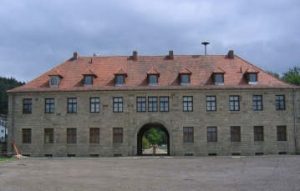 share in its struggles, even if it looked like there was no hope. Shortly after his return, one leader of the Confessing Church was arrested and another fled to Switzerland. Bonhoeffer’s authorization to teach revoked in 1936. He could not teach after being denounced as a pacifist and enemy of the state. Things grew steadily worse, and finally, because of his opposition to the Nazi regime, Bonhoeffer was arrested. He was “sentenced” to death and on April 9, 1945, was executed at the Flossian concentration camp. It was the last month of the war. He had almost survived. He remains an important symbol of opposition to Hitler, and his views on Christianity continue to be influential.
share in its struggles, even if it looked like there was no hope. Shortly after his return, one leader of the Confessing Church was arrested and another fled to Switzerland. Bonhoeffer’s authorization to teach revoked in 1936. He could not teach after being denounced as a pacifist and enemy of the state. Things grew steadily worse, and finally, because of his opposition to the Nazi regime, Bonhoeffer was arrested. He was “sentenced” to death and on April 9, 1945, was executed at the Flossian concentration camp. It was the last month of the war. He had almost survived. He remains an important symbol of opposition to Hitler, and his views on Christianity continue to be influential.

